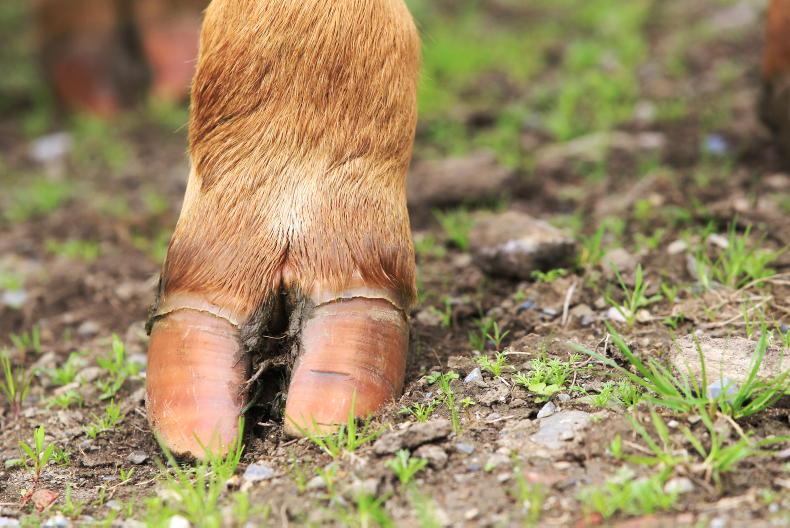Rising summer temperatures means Ireland is now entering a higher-risk period for the bluetongue virus to enter the country.
Bluetongue has spread across most of England and this increases the risk of infected midges being blown on the wind across the Irish Sea in the coming months, the Department of Agriculture has said.
From 1 July 2025, the restricted zone for bluetongue will be extended to cover all of England, which will result in movements being permitted without a bluetongue licence or pre-movement test in England, as per current control measures.
On the back of this, Scotland and Wales have updated their bluetongue guidance.
From 1 July, livestock will require movement licences to go from England into Scotland and Wales.
Since Friday, any susceptible ruminants going to Wales will require a specific movement licence and a valid pre-movement test.
A total of 262 bluetongue serotype-3 (BTV-3) cases have been confirmed in sheep and cattle in Britain during the 2024-2025 vector season.
A ban on live cattle and sheep imports from Britain to Ireland remains in place.
Vigilance
“It is critical that all livestock farmers maintain vigilance for any suspicions of this disease and report any such suspicions to their local regional veterinary office without delay,” the Department has advised.
“Bluetongue does not affect human health or food safety. However, if bluetongue virus entered Ireland, it would have serious trade implications for live animals and germinal products,” it added.
Vaccines
Vaccination against BTV-3 is not permitted in Ireland. Vaccination for BTV-3 has been authorised in Britain and other EU countries. Three vaccines have now obtained European Marketing Authorisation for use in exceptional circumstances:
Syvazul BTV 3 (sheep).Bluevac 3 (sheep and cattle).Bultavo 3 (sheep and cattle).“The duration of the immunity period guaranteed in the specifications of these vaccines has not been determined.
“As a result, animals vaccinated with the BTV-3 vaccines do not currently meet EU standard certification requirements and cannot be certified for the purposes of movement to Ireland,” the Department said.
Read more
NI farming braced for bluetongue outbreak
Scots and Welsh publish new bluetongue guidance
Department seeking additional bluetongue testing services
Rising summer temperatures means Ireland is now entering a higher-risk period for the bluetongue virus to enter the country.
Bluetongue has spread across most of England and this increases the risk of infected midges being blown on the wind across the Irish Sea in the coming months, the Department of Agriculture has said.
From 1 July 2025, the restricted zone for bluetongue will be extended to cover all of England, which will result in movements being permitted without a bluetongue licence or pre-movement test in England, as per current control measures.
On the back of this, Scotland and Wales have updated their bluetongue guidance.
From 1 July, livestock will require movement licences to go from England into Scotland and Wales.
Since Friday, any susceptible ruminants going to Wales will require a specific movement licence and a valid pre-movement test.
A total of 262 bluetongue serotype-3 (BTV-3) cases have been confirmed in sheep and cattle in Britain during the 2024-2025 vector season.
A ban on live cattle and sheep imports from Britain to Ireland remains in place.
Vigilance
“It is critical that all livestock farmers maintain vigilance for any suspicions of this disease and report any such suspicions to their local regional veterinary office without delay,” the Department has advised.
“Bluetongue does not affect human health or food safety. However, if bluetongue virus entered Ireland, it would have serious trade implications for live animals and germinal products,” it added.
Vaccines
Vaccination against BTV-3 is not permitted in Ireland. Vaccination for BTV-3 has been authorised in Britain and other EU countries. Three vaccines have now obtained European Marketing Authorisation for use in exceptional circumstances:
Syvazul BTV 3 (sheep).Bluevac 3 (sheep and cattle).Bultavo 3 (sheep and cattle).“The duration of the immunity period guaranteed in the specifications of these vaccines has not been determined.
“As a result, animals vaccinated with the BTV-3 vaccines do not currently meet EU standard certification requirements and cannot be certified for the purposes of movement to Ireland,” the Department said.
Read more
NI farming braced for bluetongue outbreak
Scots and Welsh publish new bluetongue guidance
Department seeking additional bluetongue testing services






 This is a subscriber-only article
This is a subscriber-only article










SHARING OPTIONS: